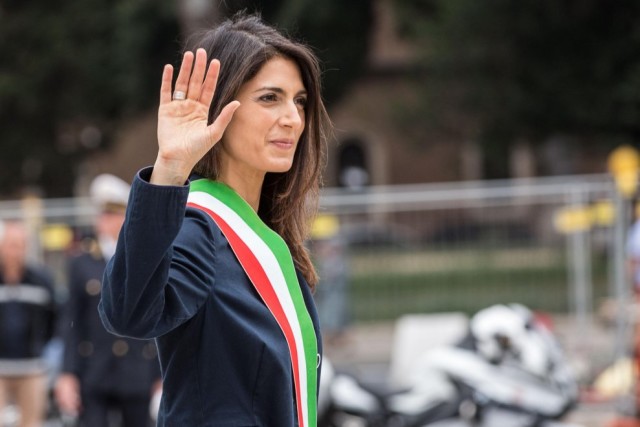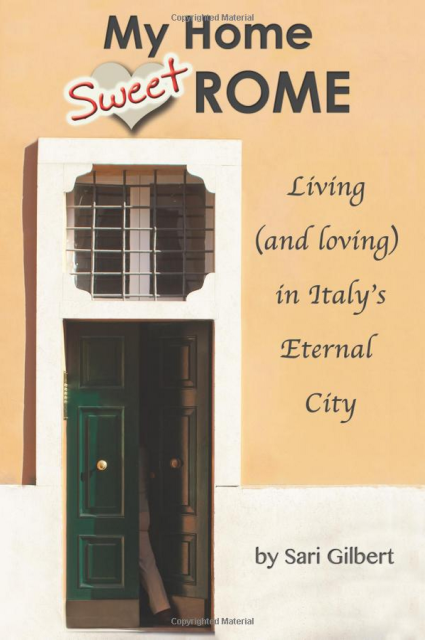For Rome’s new mayor, an uphill road.
 Italy’s new young mayor, Virginia Raggi, a member of the anti-establishment 5-Star Movement party (M5S), earlier this month managed to convince a majority of Roman voters that a new broom will really sweep clean. But, boy oh boy, is she going to have her work cut out for her.
Italy’s new young mayor, Virginia Raggi, a member of the anti-establishment 5-Star Movement party (M5S), earlier this month managed to convince a majority of Roman voters that a new broom will really sweep clean. But, boy oh boy, is she going to have her work cut out for her.
Raggi, soon to be 38, a lawyer specializing in civil matters but who has next to no governing experience, took office more or less on the same day that Rome court officials filed charges against several city employees for taking bribes in 2013 for awarding contracts to social organizations. The new arrests came 18 months after dozens of city employees were sent to jail or put under home arrest when it became known that they were taking bribes to facilitate public contracts to other social agencies with criminal ties who then provided substandard − or, sometimes, non-existent – services often regarding hospitality for immigrants or refugees from Africa and the Middle East. At the time, one of the criminals involved in what has come to be known as “Mafia Capitale” was overheard, in a phone tap, boasting that more money was being made from the immigrant arrivals than from drug trafficking.
Raggi is the first woman ever to serve as the mayor of Italy’s capital (the city of Turin also elected a woman for the first time this year). But being a woman is unlikely to represent a problem; although Italy’s parliament has fewer women members than other European countries, there have been dozens of high-powered women in Italian politics over the decades.
What is going to be difficult for a neophyte is to exert significant influence over local power strongholds such as the unions, the city police and the local utility companies. It is also unclear to what degree Raggi has sufficient personal clout to be able to control her own party or whether she was merely an acceptable face for them to put forward. Certainly, she has a leg up thanks to her party’s sweeping victory at the polls; the M5S now controls 29 of the 48 seats in the City Council and the opposition – 19 seats – is divided among seven different political groupings. The once dominant party, the Partito Democratico or PD, now has only 7 representatives in that body.
There is little doubt that the M5S, which burst onto the scene only 13 years ago and has been capitalizing on the dissatisfaction that many Italians feel towards those who have been governing it, will be doing its best to govern Rome efficiently. The party founded by the (to my mind, obnoxious) comedian, Beppe Grillo, sees its victory in the capital as a possible stepping stone to governing the entire country. Vice versa, the PD’s defeat in Rome is seen as a major setback for PD Prime Minister Matteo Renzi.
But the M5S may also be its own worst enemy. The new mayor has been struggling to form a cabinet, at least in part because she is asking all future city commissioners to sign a contract promising to back all goals decided on by the party leadership and setting a fine of 150 Euros for any one breaking faith. This may be an attempt to bypass the sluggish city bureaucratic machine in decision-making but so far at least has met with considerable opposition. The new M5S mayor of Turin, Chiara Appendino (who at 31 is even younger than Raggi, although I find she projects a more dynamic image), has done no such thing.
But the city’s problems are enormous; as someone who has lived in Rome since 1972, I can easily say that the city is in a state of chaos rarely seen before. The M5S’ platform called for improving the city’s appearance – dirt, uncollected garbage, dog shit, and hundreds of unlicensed peddlers – something which should be relatively easy, and fighting corruption, which will be extremely difficult. Last year, in comments made in Milan where he was being honored, Raffaele Cantone, the head of Italy’s National Anti-Corruption authority, said Rome lacks the necessary antibodies to withstand corruption. And on winding up a six-month term as Rome’s emergency administrator following the resignation last November of mayor Ignazio Marino, prefect Francesco Paolo Tronca said fighting corruption in Rome was a challenge. The city’s bureaucratic machinery was so complex, rusty, fragmented and out of sync with the times, he said, that it was easy for corrupt officials to hide their nefarious doings. When he took office, one of the first things Tronca did was to install a plan of rotation for high-level bureaucrats. But almost nothing has happened because they have all gone to court, which in Italy means that months, if not years, will pass before the issues are resolved.
Along with the problem of corruption and its deep-seated roots, Raggi has to deal with a city that while nearing bankruptcy is in need of huge amounts of investment. The potholes in a city where thousands ride motorcycles and scooters have gotten way out of hand. Public transport is totally inadequate. And garbage collection is often sporadic.
In view of the city’s needs, Raggi has so far appeared negative or at best lukewarm on the prospect of Rome’s hosting the 2024 Olympics. She has also promised to get the Roman Catholic Church to finally pay its millions of unpaid real estate taxes. She is a practicing Catholic but has implied she will not hesitate to insist on what some say are unpaid taxes amounting to as much as €400 million.
.
.


